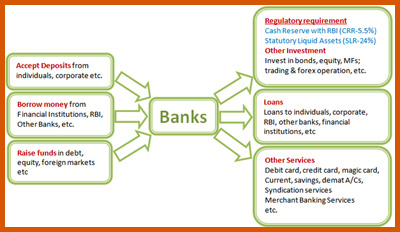SARFAESI: SARFAESI proceedings
 Many argue that the provisions of SARFAESI Act, 2002 are draconian in nature. Borrowers do often refer to their good relations with the Bank for a considerable time and they express angst at the Bank’s action under the provisions of the SARFAESI Act, 2002. The borrowers do often question as to why the Bank should not consider the reputation of the customer, understand the temporary difficulties and grant time rather proceeding against the ‘Secured Asset’ using the provisions of the SARFAESI Act, 2002 mechanically. The situation of the borrowers may be sympathetic to the officials of the Bank at times, but, they too can do nothing when an account becomes a ‘Non-performing Asset’. The officials of the Bank are bound to act against the ‘Non-performing Assets’ in accordance with their internal guidelines and in accordance with the provisions of the Act. The argument that the provisions of the SARFAESI Act are draconian was set-aside by the Constitutional Courts while giving guidelines and clarifying the legal position from time to time. Many argue that the provisions of SARFAESI Act, 2002 are draconian in nature. Borrowers do often refer to their good relations with the Bank for a considerable time and they express angst at the Bank’s action under the provisions of the SARFAESI Act, 2002. The borrowers do often question as to why the Bank should not consider the reputation of the customer, understand the temporary difficulties and grant time rather proceeding against the ‘Secured Asset’ using the provisions of the SARFAESI Act, 2002 mechanically. The situation of the borrowers may be sympathetic to the officials of the Bank at times, but, they too can do nothing when an account becomes a ‘Non-performing Asset’. The officials of the Bank are bound to act against the ‘Non-performing Assets’ in accordance with their internal guidelines and in accordance with the provisions of the Act. The argument that the provisions of the SARFAESI Act are draconian was set-aside by the Constitutional Courts while giving guidelines and clarifying the legal position from time to time.
The problem comes to the borrowers in ascertaining the clear legal position under the provisions of the SARFAESI Act, 2002 and it’s a very complicated thing. Even when the borrower approaches a professional asking for an advice, the professional may not be in a position to give clear suggestion to the borrowers. There is an example. In SARFAESI proceedings, the barrower and the Bank officials may communicate with each other and at the same time, they think about defending their respective rights in accordance with law. In many cases, the borrowers approach a professional asking for an advice based on the communication or the oral communication from the officials of the Bank concerned. The Bank officials may ask the borrowers to deposit some amount and may promise that the action under SARFAESI Act may be deferred based on the payment. It will be very difficult for a professional to opine on the Bank’s offer.
It is very clear that the borrower may not be in a position to get any relief from the Debt Recovery Tribunal under section 17 of the SARFAESI Act, 2002 when there is no ground. Professionals may usually put some grounds and file an appeal based on the request made by the borrower under Section 17 of the Act, but, there is decrease in this tendency, of late. Earlier, based on the grounds in the Appeal filed by the borrower under section 17 and without even listening to the reply or the version of the Bank, the Debt Recovery Tribunal used to grant an interim-stay subject to few conditions like depositing some ‘nominal amount’. The usual grounds of an appeal under section 17 of the Act can be as follows:
 1. The Bank has grossly erred in calculating the outstanding due and the Bank has also not provided the statement of accounts from time to time despite a written request. 1. The Bank has grossly erred in calculating the outstanding due and the Bank has also not provided the statement of accounts from time to time despite a written request.
2. The Bank has no right to proceed against the ‘Secured Asset’ as the borrower is not a ‘willful defaulter’.
3. The Bank has not appraised the borrower while classifying the account as ‘Non-performing Asset’. Had the Bank informed the borrower about classification, the borrower should have taken appropriate steps.
4. The Borrower has not received any notice under section 13 (2) of the Act and the borrower has come to know about the Bank’s action only when few officials of the Bank inspected the property and wanted the borrower to vacate it.
5. The Bank has not responded to the objections raised by the borrower under Section 13 (3-A) of the Act.
6. The Bank has promised to regularize the account upon the payment of some substantial amount and even after the payment; the Bank has not regularized the Account and as such the account can not be treated as ‘Non-performing Asset’.
7. The Bank has failed to proceed against the borrower and instead harassing the guarantor.
8. The Bank is not right in not proceeding against the property of the borrower and it is illegal to proceed against the property of the guarantor without proceeding against the borrower.
9. There was no ‘valid mortgage’ with the Bank at all.
10. The Bank is preparing to sell the valuable property of the borrower/guarantor at pittance and the Bank is colluding with the bidders.
11. The Auction process is unfair and illegal.
The above are the few grounds and there can be many more grounds to file an appeal under section 17 of the SARFAESI Act, 2002. No purpose will be served by filing an appeal mechanically unless the intention of the borrower is bonafide and unless there is arguable case against the Bank. It can never be said that the Bank or Bank officials are always right and the borrower is always a ‘willful defaulter’. The borrower may be genuine in his grievance against the Bank and he may simply want to fight for his rights against the Bank.
It is an allegation that the Debt Recovery Tribunals do favour the Banks and do not even listen to the borrowers even when there is a good case for the borrowers. I would like to give one example as to why borrowers/guarantors/public feels this way and the example is as follows:
Facts & Proceedings:
 A person named ‘AB’ wants purchase a property from a person named ‘BC’. A person named ‘AB’ wants purchase a property from a person named ‘BC’.
- While intending to purchase the property, Mr.AB wanted to inspect the original title deeds of the property of ‘BC’ and also wanted to check encumbrance over the property.
- As the Original Deeds are available with ‘BC’ which are in order and as there is no encumbrance over the property, Mr.AB has purchased the property for a valuable considerable after paying requisite Stamp Duty and registration charges.
- The property is handed-over to Mr.AB and Mr.AB has invested considerable amount further in the property.
- While the property is in possession of Mr.AB, suddenly a Bank named ‘DE’ has affixed a notice under section 13 (4) at the property.
- Shocked at the notice, Mr.AB has approached the Bank and wanted the details as to why the notice is affixed at the property.
- The Bank has replied saying that the property is mortgaged with the Bank with due registration by Mr.AB and he has defaulted to repay loan.
- Further enquiry has revealed that the Bank is at fault while getting the property mortgaged from Mr.AB and there is no reason as to why they have not insisted for the Deposit of Title Deeds.
- As there is no option, Mr.AB has filed an appeal under Section 17 of the SARFAESI Act, 2002 alleging everything as to how he is a bonafide purchaser. He also leveled clear allegations against the Bank and their negligent attitude.
- The Appeal is dismissed by the Debt Recovery Tribunal vaguely saying that the Bank has followed the procedure correctly under the provisions of SARFAESI Act, 2002 and without noting or dealing with the allegation
 pertaining to mortgage and without noting that the Bank has not replied to the charges made by the Appellant. pertaining to mortgage and without noting that the Bank has not replied to the charges made by the Appellant.
- Mr.AB, as there is no option, has filed an Appeal with the DRAT. While the Appeal is pending, the Bank has brought the property for auction and while the proceeding is going on, the Bank has completed the Auction and says that it has confirmed the auction infavour of the ‘only bidder’ who bid the property on a particular date.
- Mr.AB is being asked now to get the details of the bidder, implead him as party to the proceedings and also asked to challenge the act of Sale afresh.
The above case is an example as to how borrowers/guarantors and public get troubled with this recovery system. It may be true that that the Bank is supposed to defeat the unfair attitude of the borrower, but, there is a law and if the borrower raises a considerable legal point, the same is to be considered. Law is always supported by logic, and it can not be said that the legal point or right being raised by the borrower/person can be ignored without any reason. Against this background, of late, even the High Courts coming heavily against the Bank and High Court is setting-aside the proceedings of DRT or DRAT. |